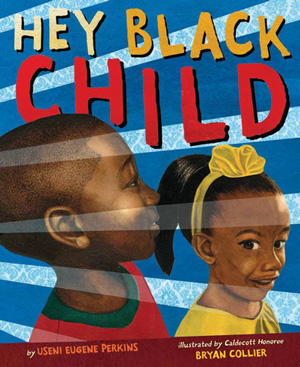Useni Eugene Perkins On Adapting His Iconic Poem into Picture Book Form
 Though poet and playwright Useni Eugene Perkins’s debut picture book, Hey Black Child (Little, Brown, Nov. 2017), is a recent publication, his powerful celebration of Black childhood is already iconic. Perkins penned the poem in 1975, and since then many students in his hometown of Chicago have started their day by reciting it. Bryan Collier’s spectacular watercolor and collage images of kids realizing their dreams infuse the text with energy as it meets a new audience.
Though poet and playwright Useni Eugene Perkins’s debut picture book, Hey Black Child (Little, Brown, Nov. 2017), is a recent publication, his powerful celebration of Black childhood is already iconic. Perkins penned the poem in 1975, and since then many students in his hometown of Chicago have started their day by reciting it. Bryan Collier’s spectacular watercolor and collage images of kids realizing their dreams infuse the text with energy as it meets a new audience.
Why did you write the poem? “Hey Black Child” was the result of a children’s play I wrote, Black Fairy. Black Fairy is a fairy tale, but not in the traditional sense, about a Black boy with low self-esteem, who lacks an appreciation of his heritage and culture. During the final stages of production, Pemon Rami, director of the [La Mont Zeno Theatre], suggested it needed a closing lyric. I wrote “Hey Black Child,” with music by Tony Llorens. The play became an immediate success and was performed at many theaters. Black Fairy consisted of over 12 original songs, but “Hey Black Child” became a singular favorite, and children began reciting it with regularity. In fact, some schools in Chicago had their students recite the poem each morning before classes.
The poem has been incorrectly attributed to Maya Angelou and Countee Cullen. In 1980, my brother Toussaint Perkins produced a poster of “Hey Black Child,” which was widely circulated. However, he put only “Useni” on the poster, and this may have led people to identify it with other poets. But I am surprised that it has been associated with Countee Cullen, one of the great Harlem Renaissance poets, because Cullen’s style was primarily influenced by such Victorian poets as Keats, Shelley, and Wordsworth. Maya Angelou wrote in free verse and did not write poems for children. When “Hey Black Child” was recited by three-year-old Pe’Tehn Raighn-Kem on Val Warner’s television show in Chicago, she attributed the poem to Countee Cullen. Later she corrected this misinformation when she recited the poem on Steve Harvey’s Little Big Shots.
 Did you communicate with Bryan Collier about the art? I was familiar with his outstanding work and reputation. However, we never met, yet he was able to capture the spirit and reverence of my poem with vivid images of children and contextual colors that would lead one to believe we had collaborated on the project every day. I’m mindful that words are important, but when embellished with the creative work of a talented artist like Bryan, they…capture and illuminate the human spirit.
Did you communicate with Bryan Collier about the art? I was familiar with his outstanding work and reputation. However, we never met, yet he was able to capture the spirit and reverence of my poem with vivid images of children and contextual colors that would lead one to believe we had collaborated on the project every day. I’m mindful that words are important, but when embellished with the creative work of a talented artist like Bryan, they…capture and illuminate the human spirit.
Often books on Black history are somber. However, your language, paired with Collier’s illustrations, is jubilant. I have always felt that literature for children must entertain yet be cognizant of the ethos of a child’s verbal disposition, culture, and history. It should provide images that reflect a variety of artistic styles and themes but remain anchored in reality. For Black children, this is particularly important because so much of their history has been maligned by stereotypic images and racial stigmas. I believe Hey Black Child helps [children] feel a sense of pride.
Do you plan to pursue more picture books? I would be interested in doing books on Ida B. Wells, Paul Robeson, and Kwame Nkrumah, president of Ghana, the first African nation to gain its independence. There are many facets of Black history and culture that would provide all children with visions and stories that are entertaining and informative. If we are serious about addressing the racial divide, this can best be done during children’s formative years, when their moral compass and respect and appreciation for all humanity are developed. As the poet Mari Evans stated, “Speak the truth to the people.”
RELATED
The job outlook in 2030: Librarians will be in demand
The job outlook in 2030: Librarians will be in demand
ALREADY A SUBSCRIBER? LOG IN
We are currently offering this content for free. Sign up now to activate your personal profile, where you can save articles for future viewing






Add Comment :-
Be the first reader to comment.
Comment Policy:
Comment should not be empty !!!